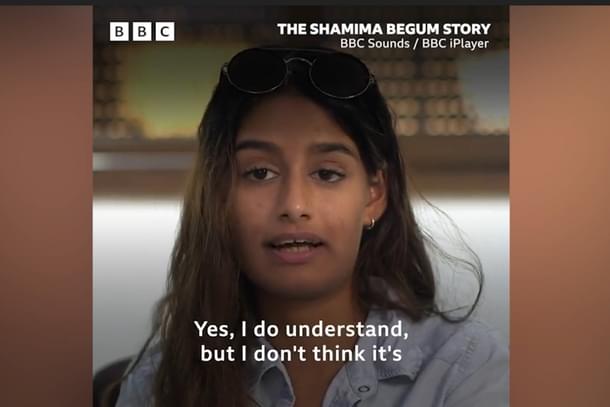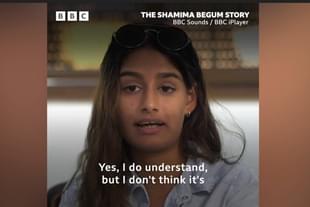World
BBC Faces Anger From Britishers For Airing Podcast And Documentary On 'ISIS Bride' Pleading To Return To The UK
Swarajya Staff
Feb 10, 2023, 10:42 AM | Updated 10:41 AM IST
Save & read from anywhere!
Bookmark stories for easy access on any device or the Swarajya app.


As per various news reports published in the United Kingdom, the British public is angry with state broadcaster BBC for making a seemingly sympathetic documentary on a woman who left the UK to joined Islamic State.
Shamima Begum, now 23, is a British-born woman of Bangladeshi roots who went to Syria in 2015 to support the ISIS group and was stripped off her British citizenship in 2019 on grounds of national security.
The matter is contentious because she was 15 years old when she left. Her attempts to return to the UK have been widely reported in the media.
The BBC documentary follows a 10-part podcast on Shamima it released a week earlier.
Critics are accusing the BBC of “parading her as if she is some sort of celebrity” and “presenting the jihadi bride as a ‘vulnerable young girl’ with ‘beautifully staged, moody shots, ominous back track and tearful pieces to camera’", wrote Dailymail.co.uk in a report published on 8 February.
The report says the broadcaster was flooded with warnings by viewers that they would not renew their licence, which costs Euro 159 annually.
Many took to social media to express their anger, with comments such as — 'Sickened to have watched the BBC's airing of 'The Shamima Begum Story' and 'Please tell me why the BBC are giving Shamima Begum the time of day? That girl has zero remorse and I don't know why I have to see her on my TV? She had a choice — she made her choice. Vile.'
Shamima went to Syria with two friends, Kadiza Sutana and Amira Abase, who are believed to have been killed there.
Shamima was spotted by journalists at a refugee camp in 2019, after which the government withdrew her citizenship.
During her stay in Syria, she married an ISIS man and gave birth to three children, all of whom died as infants. Shamima is currently living at the Al-Roj camp in northern Syria, run by the Syrian Democratic Forces.
She has described her stay in the refugee camp as being worse than prison, saying prison sentences have an end date.
The broadcaster was already facing public backlash over a 10-part podcast on her before they released the "The Shamima Begum Story" on 7 February.
The anger by the British public against BBC is reported at a time when it is facing public and government backlash in India over a documentary on India’s internal affairs, with accusations of being highly biased against the country’s majority population and the democratically elected government.
The documentary is available for viewers in the UK here.




